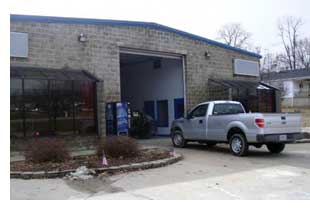Small Businesses:
 Proper
management of hazardous waste is important to safeguard human health and the environment. Many small businesses handle propane,
ammonia, chlorine, and other chemicals that could pose a risk to the surrounding community if an accident were to occur. Training
employees and inspecting and maintaining equipment is essential to any successful business.
Proper
management of hazardous waste is important to safeguard human health and the environment. Many small businesses handle propane,
ammonia, chlorine, and other chemicals that could pose a risk to the surrounding community if an accident were to occur. Training
employees and inspecting and maintaining equipment is essential to any successful business.Small businesses that generate hazardous waste are regulated by state and federals laws as either 1) conditionally exempt small quantity generators (CESQGs) that generate less than 220 pounds in any calendar month 2) small quantity generators (SQGs) that generate between 220 pounds and 2,200 pounds in any calendar month, or 3) large quantity generators (LQGs) that generate more than 2,200 pounds, or more than 2.2 pounds of acutely hazardous waste in any calendar month, or 220 pounds acute spill residue.
Contaminants of Concern:
Typical small businesses that report hazardous waste, and the typical waste associated with those businesses, include:- Drycleaning and Laundry Plants: Still residues from solvent distillation, spent filter cartridges, cooked powder residue,
spent solvents, unused perchloroethylene
- Furniture/Wood Manufacturing and Refinishing: Ignitable wastes, toxic wastes, solvent wastes, paint wastes
- Construction: Ignitable wastes, toxic wastes, solvent wastes, paint wastes, used oil, acids/bases
- Laboratories: Spent solvents, unused reagents, reaction products, testing samples, contaminated materials
- Vehicle Maintenance: Acids/bases, solvents, ignitable wastes, toxic wastes, paint wastes, batteries, used oil, unused
cleaning chemicals
- Printing and Allied Industries: Acids/bases, heavy metal wastes, solvents, toxic wastes, ink, unused chemicals
- Equipment Repair: Acids/bases, toxic wastes, ignitable wastes, paint wastes, solvents
- Pesticide End-Users/Application Services: Used/unused pesticides, solvent wastes, ignitable wastes, contaminated soil
(from spills), contaminated rinsewater, empty containers
- Educational and Vocational Shops: Ignitable wastes, solvent wastes, acids/bases, paint wastes
- Photo Processing: Acid regenerants, cleaners, ignitable wastes, silver
- Leather Manufacturing: Acids/bases, ignitables wastes, toxic wastes, solvent wastes, unused chemicals
Implementing Solutions:
Please submit your experiences (successes/challenges) and tribal-specific documents to share on our website using the attached form.Download Form
Resources:
EPA's Managing Your Hazardous Waste: A Guide for Small Businesses [pdf]Arizona Department of Environmental Quality's Managing Hazardous Waste: A Handbook for Small Businesses [pdf]
Bienniel Hazardous Waste Report Frequently Asked Questions [pdf]
EPA Basic Awareness Factsheet for Small Business [pdf]
Websites:
EPA Information for Small Businesses:www.epa.gov/resources-small-businesses
Related Pages:
Hazardous Substance Reporting RequirementsHazardous Substance Response
For more information, please contact:
Jennifer Williams, Alaska Program Coordinator, Sr.
Tel: 928/523-0673
Email: Jennifer.Williams@nau.edu
Tel: 928/523-0673
Email: Jennifer.Williams@nau.edu
Last updated: July 10, 2015
